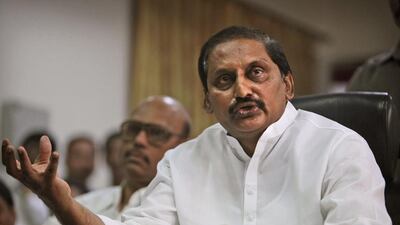NEW DELHI // The chief minister of Andhra Pradesh resigned yesterday after the lower house of parliament passed a bill that will split the state in two.
Kiran Kumar Reddy said he was stepping down “with a heavy heart” to protest against the division of Andhra Pradesh into Telangana and Seemandhra.
He also quit his party, the Congress, which aims to get the bill ratified by parliament’s upper house by tomorrow.
Amid vociferous opposition and an unprecedented cut of parliament’s live TV feed, the ruling Congress party on Tuesday cobbled together the votes in the Lok Sabha, the lower house, to pass the bill.
Yesterday, fights broke out in the Rajya Sabha, parliament’s upper house, which adjourned without voting on the bill.
Should the Rajya Sabha pass the bill intact, it will go to India’s president for his signature. However, if amendments are made, the Lok Sabha must approve them before sending the bill to the president.
Among other amendments, the opposition Bharatiya Janata Party (BJP) is asking for a common governor to be custodian of both states for 10 years.
Once the legislation is signed into law, Telangana will become India’s 29th state. The Congress has until tomorrow, the last parliament session ahead of May elections, to pass the bill.
In Telangana, a region that has demanded statehood for more than 40 years, celebrations began on Tuesday. University students held victory rallies and local pro-bifurcation political party workers gathered jubilantly in their offices.
Telangana’s political parties have claimed that their region lacks representation and is neglected by the Andhra Pradesh legislature.
But in Seemandhra, the coastal rump of Andhra Pradesh, protests and demonstrations broke out against the bill. Seemandhra and many of its local political parties are opposed to the formation of Telangana.
The fate of Hyderabad, Andhra Pradesh’s capital and an economic centre, is contentious. The legislation in parliament puts Hyderabad geographically within Telangana. The bill stipulates that Hyderabad will serve as a shared capital for a decade before reverting to Telangana.
Protests are likely to continue. Seemandhra’s political parties have announced plans to shut public services in the region.
Buses, schools and some shops were forced to close yesterday.
“Paramilitary and state police forces have been deployed at different locations, including public places and central government offices, as a precautionary measure,” said R Umapathi, a senior police officer in Visakhapatnam, told the Press Trust of India, a town in Seemandhra.
There has been widespread criticism over how the bill was passed as there was little debate in the halls of the Lok Sabha.
Mr Reddy called it undemocratic and disgraceful.
“The majority of Andhra Pradesh was against [the formation of] Telangana,” he said.
Kamal Nath, the minister for parliamentary affairs, said yesterday that the bill “was passed absolutely according to rules”.
The creation of Telangana may also reignite other demands for statehood around the country – in the region of Vidarbha in Maharashtra, for example, or in Gorkhaland in east India.
K Nageshwar, a political analyst in Hyderabad, called the Congress strategy “quite diabolical”.
“It’s clear they’ve reserved this decision until the very end of the government’s tenure,” he said. “They want to capitalise on all this emotion when Telangana goes to vote.”
ssubramanian@thenational.ae

